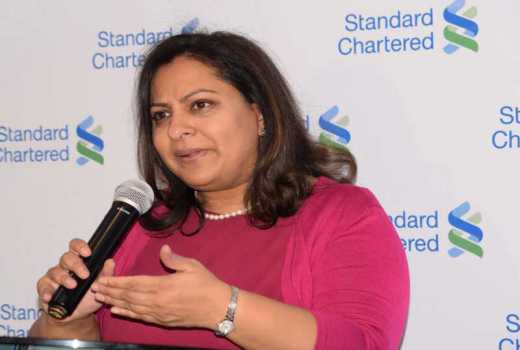Standard Chartered Bank Reports Highest Operating Profit in Africa Since 2015
Standard Chartered PLC has announced that its financial results for the full year and fourth quarter ending 31 December 2021shows a record of highest operating profits in Africa and the Middle East region since 2015.
The performance highlights show a broad-based growth and improvement in income and profits. Income grew by 3.5 per cent to USD 2,446 million despite the adverse impact of rate cuts on margins. Record levels of income were reported in the bank’s Financial Markets and Wealth Management business

Sustained Cost discipline resulted in a net reduction of 4 percent year-on-year despite continuing investments. This generated positive income-to-cost jaws of 7 percent. Pre-provision Operating Profit increased by 21 percent year-on-year. Operating Profit grew to a robust USD 856 million, recording the highest level since 2015.Strong improvement in the region’s Return of Tangible Equity (ROTE) ratio at 8.8 per cent
Read also Nigerian Based GTCO Completes Acquisition of Asset Management and Pension Fund Businesses
Geographical Highlights:
A significant turnaround in the UAE with a healthy Operating Profit of USD 242 million compared to a USD 110 million during the same period last year, driven by cost reductions and de-risking actions
Pakistan delivered its highest ever Operating Profit, driven by strong balance sheet growth and continued productivity improvements
Middle East (ex-UAE) saw strong income growth driven by Saudi Arabia while maintaining cost discipline, resulting in a multi-year high level of Operating Profit.
The Bank’s income in Africa grew by 9 per cent on a constant currency basis driven by the digital banking momentum and strong pipeline conversion; Operating Profit for Africa was at the highest level since 2015.
Read also Nigerian B2B Payments Startup Duplo Bags $1.3m In Pre-seed Round
Commenting on the results, Sunil Kaushal, Regional CEO, Africa and Middle East said: “2021 was an exceptional year for us in the Africa and Middle East region. Our record financial performance demonstrates the progress made in the execution of our strategy. It is testament to the hard work and commitment of our team and the continued cost discipline which has allowed investments to continue though the cycle”.
Th record performance was also driven by income growth despite the lower interest rate which impacted the bank’s cash management and retail businesses.
“Throughout the year, we accelerated our digital transformation, proudly expanding our digital banking network in Pakistan, in turn strengthening our customer base through enhanced connectivity. Aligned to the Kingdom of Saudi Arabia’s vision 2030, we have also expanded our presence in Saudi Arabia last year to provide project finance, capital markets and cash management support to promote trade and investments.” Sunil concluded.
Read also How a common network security technology stack aligns IT & Cybersecurity
Standard Chartered Bank’s Africa, Middle East Region has received the following awards for the year 2021 which solidifies the Bank’s robust progress as industry leaders in the region.
Kelechi Deca

Kelechi Deca has over two decades of media experience, he has traveled to over 77 countries reporting on multilateral development institutions, international business, trade, travels, culture, and diplomacy. He is also a petrol head with in-depth knowledge of automobiles and the auto industry






